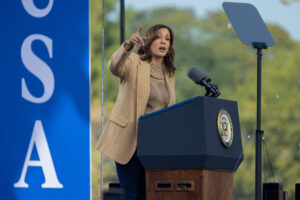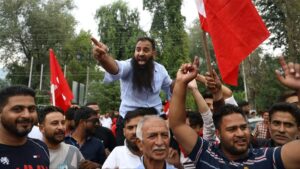Factors behind Erdogan’s victory in Turkish presidential polls
By Iftikhar Gilani
ANKARA – Against most of the predictions, Turkish President Recep Tayyip Erdogan managed to win another five-year term in office after defeating the opposition’s joint candidate Kemal Kilicdaroglu convincingly by a margin of 2.2 million votes on Sunday.
In the runoff elections, Erdogan got 52.15% votes, while his rival Kilicdaroglu got 47.85% votes.
The runoff between the first two candidates was held on Sunday, as none of the four candidates running in the first round on May 14 got the requisite 50% + 1 vote. While everybody agreed that it would be a cliffhanger and the toughest election for Erdogan, the majority of opinion polls had given Kilicdaroglu an advantage. It was also expected that everyone would unite against Erdogan once the election is pushed to the second round and thus will end his 20-year rule. But Erdogan’s clever election strategy did not allow the opposition to unite and left it even more fragmented and clueless after the first round.
Analysts are wondering what happened to the opposition which looked reinvigorated and closer to power during the election campaign. It is believed that the brazen support of Western governments and their media for Kilicdaroglu was successfully made use of by Erdogan to address nationalist voters. This helped him shift attention from high inflation, a weakening economy, and steep increases in the prices of essential goods.
Mehmet Ozturk, a leading Turkish journalist and analyst, while commenting on the results, said that inflation and the cost of living had taken a back seat, while stability and maintaining the country’s security were the driving forces.
Erdogan based his entire election campaign on the narratives of national survival and security. To flatter national pride, he unveiled projects in energy, infrastructure and military equipment, and drew a vision of a “great Türkiye.”
Referring to armed resistance by Kurdish groups in the southern region, he painted visions of resurgent terrorism, coups, Western intervention and the division of the country, and accused opposition candidate Kilicdaroglu of having ties to terrorist groups. The Kurdish political party Halkların Demokratik Partisi (HDP) had provided support to Kilicdaroglu.
He exploited the American support to the Kurd militant groups YPG in Syria by convincing the public that Syrian Kurdish militant group was actually an offshoot of Turkish Kurd terrorist group PKK, which is demanding a separate state for Kurds in the southern Türkiye. He took Kilicdaroglu head on for getting support from the HDP, seen as sympathetic to separatist militants.
-Kept economy under wraps
Even before the pandemic broke out, the country’s economy had shrunk by 10%. In recent months, foreign reserves have shrunk. There is capital flight, runaway inflation, a rise in unemployment, and even fears of food insecurity. The opposition failed to capitalize on this.
Erdogan succeeded in keeping economy under wraps by repeatedly pointed out to the enthusiastic crowd the West’s interference in Türkiye’s domestic politics by reminding them of U.S. President Biden’s 2020 statement.
“Biden gave the instruction that we must overthrow Erdogan. I know this. All my people know this. The voters will give Biden the answer,” he said at campaign events.
In an interview with the New York Times, Biden had said he would encourage the Turkish opposition to defeat Erdogan at the ballot box.
The opposition also miscalculated the impression that 11 earthquake-affected provinces in southeastern Türkiye will punish Erdogan for ineffectiveness and not putting into rescue operations in time.
As many as 50,000 people were killed in these provinces and millions are living in shelters. But except for the province of Hatay, the rest of the provinces backed Erdogan quite strongly possibly due to his promises of building some 600,000 houses free or cost. The survivors told media persons after the surprise results of the first round that they did not want the next government to reverse these promises.
An earthquake of almost similar magnitude in 1999 which struck Türkiye’s Kocaeli province had brought down the government of then Prime Minister Bulent Ecevit. Erdogan then an opposition leader had fueled public euphoria by speaking of the mismanagement, clumsy and slow response, and corruption charges against the army-backed Democratic Left Party. He came to power in 2002, as the anger had led people in droves to vote for him and punish the incumbent government for its inefficient handling.
Turkish Opposition tried to use a similar strategy to create public euphoria against Erdogan. But what saved him was his shrewd move not to oblige his own ruling AK Party leaders to defer elections by a year. He even surprised them by advancing elections by a month. Further his machinations forced the opposition to field an unassuming Kilicdaroglu rather than the high-profile Istanbul Mayor Ekrem İmamoglu as the joint candidate against him.
A source close to Erdogan says that postponement of elections to a year or even a few months would have worked against the incumbent government, as people would have voted on the actual work that he would have undertaken for the survivors.
-Significance of election dates
He also chose the dates for elections carefully. The first round on May 14 coincided with the anniversary of the first multiparty election held in Türkiye in 1950, in which Adnan Menderes became prime minister. The military regime later dismissed and then executed him. This day is now marked as democracy day in Türkiye. May 28 was also chosen carefully for the runoff. The Ottoman Army under Sultan Mehmet captured the city of Istanbul on May 29, 1453. Erdogan wanted to coincide his victory rally in the metropolis of Istanbul with its conquest by the Ottoman army.
These tactics helped Erdogan to continue his hold on lesser privileged regions of the country that include the Black Sea (Karadeniz Boelgesi), Central Anatolia (İç Anadolu Boelgesi), and Eastern Anatolia (Doğu Anadolu Boelgesi). The Opposition, however, got a heavy mandate in the richer and more developed areas like the Mediterranean region and the cities Istanbul, Ankara, Eskisehir, Izmir and southeastern Kurd regions.
Kilicdaroglu used to highlight positive agenda exuding hope and promising freedom and democracy. But after getting just 44.9% votes in the first round, he made a sharp right turn. In the second phase of his campaign, he tried to show himself more of the nationalist hardliner, thereby alienating the Kurd votes, who had backed him solidly. He was typically trying to put his feet in two boats. His alliance with racist Umit Ozdag, head of Victory Party after the first round also demoralized his liberal supporters.
Essentially, the results have shown an increased nationalist orientation among the working class and low-income groups in both urban and rural areas, despite being battered by economic turmoil.
Besides the rhetoric against the West and appealing to nationalistic sentiments, welfare schemes and freebies to voters also worked to turn tide in favour of Erdogan.
Just six days ahead of the polling, in order to celebrate the extraction of gas from the Black Sea, every household got a cheering message that cumhurbaşkan (president) has paid their fuel bills for the month of May.
It was said that the country will meet approximately 30% of its annual natural gas needs from Black Sea reserves. The same SMS also announced that households using less than 25 cubic meters of gas per month will not get any bills for one year. Like in other parts of Europe, fuel bills had become a source of concern in Türkiye as well over the past year due to the Russia-Ukraine war.
-Bigger question: What do the elections mean for the future?
Now the bigger question is what these elections will mean for Türkiye and the world. Türkiye’s geostrategic position makes it an important player, not only for the region but for the entire world.
Erdogan’s return, while signifying continuity in the policy of rapprochement in the neighbourhood and the Middle East, is bad news for the West, as its push for allowing Sweden to join NATO will have to wait.
Erdogan’s aggressive foreign policy had raised Türkiye’s profile abroad but also led to sharp differences with NATO and Western allies. Türkiye over past few years had made deep inroads in Africa and South America.
He had successfully convinced eight West African nations to withdraw their currency reserves from the French central bank, thus rubbing France in the continent. He had also helped them replace the CFA franc – the euro-linked currency used in 14 West and Central African countries – with new common West African currency, named eco.
Even though these eight West African countries which include, Benin, Togo, Burkina Faso, Mali, Senegal, Ivory Coast, Niger and Guinea Bissau had gained independence years ago, they continued to vest their foreign exchange reserves with the French central bank. They had now decided to move their reserves to Senegal-based Central Bank of West African States, set up with the help of Türkiye.
Erdogan’s desire to lead the Muslim world has already taken a back seat over the past year due to economic problems and his failure to create a sympathetic block within the Organization of Islamic Cooperation (OIC), where even Pakistan, its all-weather friend backed out under the pressure from Saudi Arabia.
A thaw with Saudi Arabia, the United Arab Emirates and Egypt, who were initially feeling threatened by Erdogan has been the most soothing news from the Middle East last year.
With the mediation of Russia and Saudi Arabia, there is now the possibility of a similar thaw in relations with Syria. Defence ministers and intelligence officials from both countries have recently held several rounds of talks in Moscow, suggesting that an end to the conflict in Syria is on the horizon. It is only a matter of time before a summit meeting between Erdogan and his Syrian counterpart Bashar al Assad.
In its bid to become the leader of the Muslim world, Türkiye under Erdogan had also created a stir in India. He is preparing to travel to India to attend the G20 summit in September. Only recently Türkiye has restored Foreign Ministry consultations with India.
Even when relations between the two countries were sour, the bilateral trade between the two countries saw 100% increase crossing $ 10.70 billion in 2021-22 from just $ 5 billion in 2020-21. Indian companies have invested about $ 126 million in Türkiye, as per Central Bank of Türkiye data. Turkish investment in India is accounted about $ 210.47 million.
As the revival of the economy will be paramount, the next government in Türkiye will try to mend fences in the neighbourhood, maintain strategic autonomy in the Russian-Ukrainian war, and also reach out to Western allies to get investment. For the West, too, despite all the rhetoric so far, there is no other way than to work with Erdogan.











